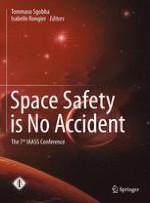2015 | OriginalPaper | Buchkapitel
Aerothermal Heating Methodology in the Spacecraft Aerothermal Model (SAM)
verfasst von : J. Merrifield, J. Beck, G. Markelov, P. Leyland, R. Molina
Erschienen in: Space Safety is No Accident
Aktivieren Sie unsere intelligente Suche, um passende Fachinhalte oder Patente zu finden.
Wählen Sie Textabschnitte aus um mit Künstlicher Intelligenz passenden Patente zu finden. powered by
Markieren Sie Textabschnitte, um KI-gestützt weitere passende Inhalte zu finden. powered by
